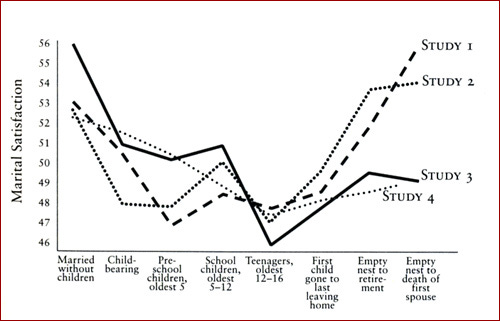A famous finding in psychology shows that people become less happy when they have children.
Like anything about happiness, the actual research is murky and contested. Some studies say it's just not true; others say it's only true in the US; an interesting one says it used to be true, but no longer, because parents have become happier and non-parents have become less happy. Still, the version I've seen most looks like this chart: happiness goes down when you have children, and it doesn't really rise again until they leave home.

Even the people who believe this most strongly won't tell you not to have children. Instead, they point to other reasons why it might be worth it—in particular, parents tend to have higher life satisfaction. This is another fuzzy concept, but it means something like, when you reflect on your life, you'll feel good about it.
Despite the murkiness, these beliefs shaped my expectations of parenthood. After our daughter was born, I figured:
I'd face more unpleasant things after being a parent.
As a result, I'd feel less happy.
But to counterbalance that, I'd feel more purpose and satisfaction.
One year in, #3 has been true: I feel like I'm contributing more good to the world, and I feel more connected to my community. And #1 has been true: I've been more exhausted (from interrupted sleep and the daily grind of caregiving), more frustrated (when she's upset and I don't know why), more upset (when she's sick and miserable and needs even more attention), and less able to do whatever I want to enjoy myself.
But despite that unpleasantness, I don't feel less happy in the day-to-day sense—if anything, I feel happier. That's partly because parenting has been surprisingly fun.
Maybe that's obvious to some people, but it wasn't to me. I didn't have much exposure to babies or little children—like most boys, I never babysat, and few friends or relatives had children until around the time I did (and the time before that was the pandemic era, so spending time with those few was harder). So I couldn't really imagine what parenting would be like beyond the basics of caregiving. I wanted children for other reasons, not because it seemed fun.
But my daughter has brought a lot of fun to my life:
Family and friends visit more often because they want to see her. When they're here, it's very entertaining to watch how she interacts with them.
Showing pictures of her to coworkers is more fun than whatever else we'd be talking about when waiting for tea to boil.
She does cute things that are enjoyable both in the moment and afterward. When Meredith and I are on a date or hanging out after she's gone to bed, we can reference those things as an inside joke and laugh.
Wanting to expose her to new things gets me out of the house to do things I might not have otherwise, like going to the zoo or visiting a farm.
Watching her develop is fascinating, and it brings me a lot of joy to see her do something new for the first time.
When I get home from the office or pick her up at daycare, she smiles and often tries to crawl over to me. (I never really understood the "kids welcoming you home from work is precious" cliché until I experienced it.)
Writing here is something I enjoy, and being a parent has helped me come up with more ideas that are worth sharing.
It's certainly not all fun; parenting involves a lot of monotony and frustration.1 And it may not be everyone's experience that the fun parts outweigh the unpleasant parts from a happiness perspective. (It may not even be mine after a few more years.) But for me it has, and I didn't really expect that.
Another way of putting this is that parenting increases the volatility of your happiness: happy times are happier, and unhappy times are less happy. If you believe the peak-end rule, this means people will remember their time as parents fondly, even if their average happiness wasn't very high.



I loved this!
For me, having adult children fits exactly into your description.
Having grandchildren and great nieces rewards the grandparents and great aunts with a ratio of happiness to unhappiness that leans heavily toward happiness. As long as the young ones are healthy and happy, we are beyond the moon.